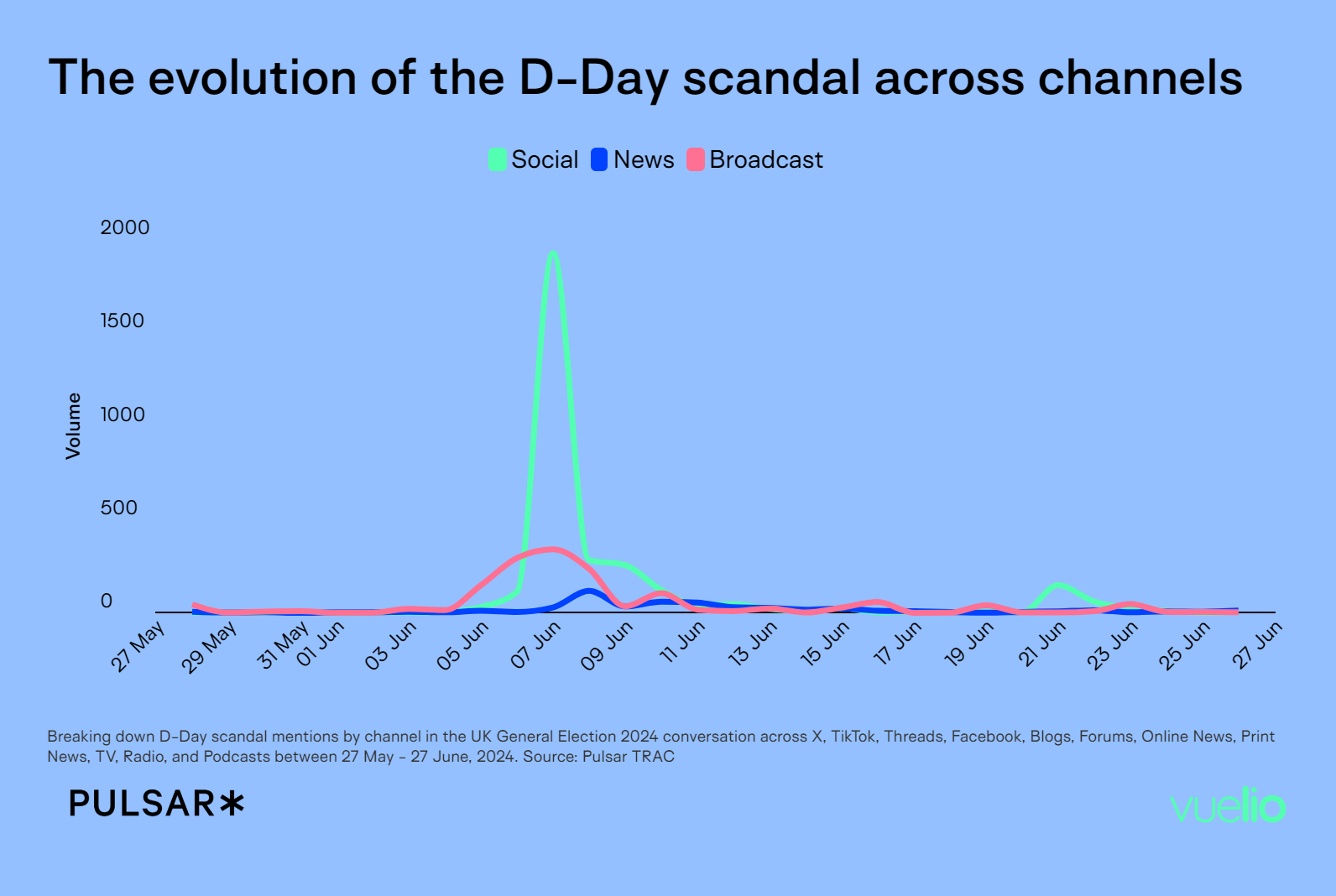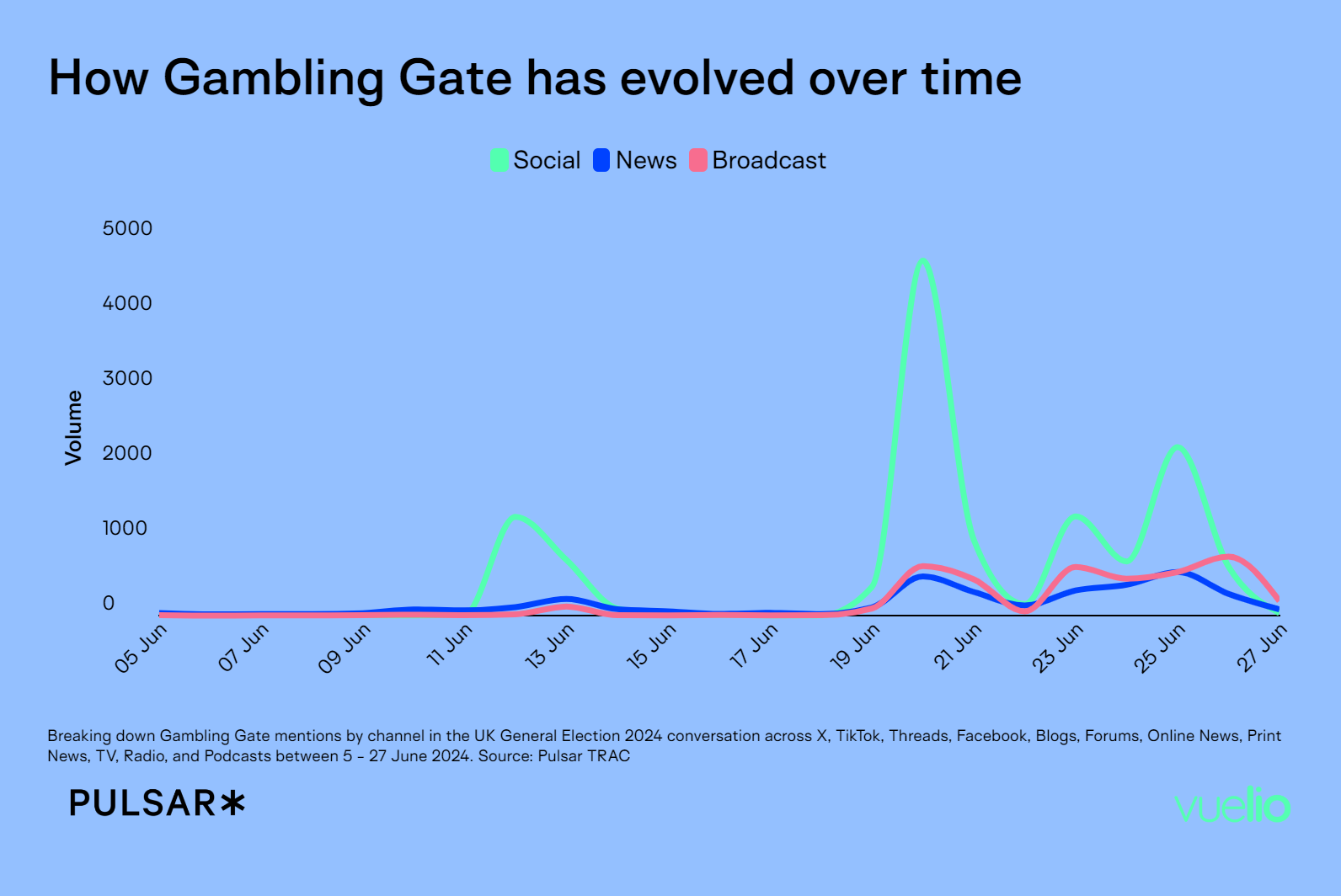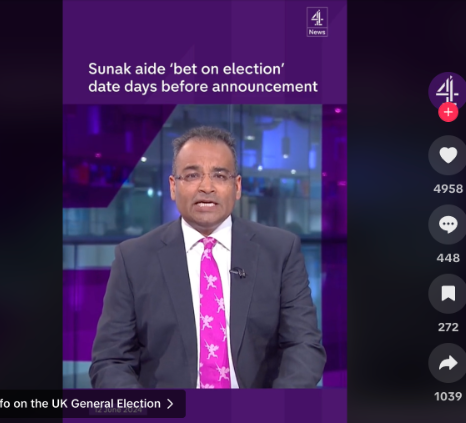The scandals of General Election 2024: How the D-Day and gambling controversies spread among audiences
By Phoebe-Jane Boyd, Dahye Lee, and Ingrid Marin.
While political experts predict a lack of enthusiasm from the public when it comes to voting on 4 July, there has been growing interest in the scandals of the UK 2024 General Election across the press and social media.
The big two controversies providing catalysts for column inches and social snarking? Prime Minister Rishi Sunak’s early departure from this year’s D-Day celebrations, and the numerous political figures currently under investigation for gambling on the election date.
With no two scandals quite the same, we explore how each story reached audiences on different platforms and grew, analysing the UK General Election 2024 conversation across online and print news, TV, radio, and podcasts as well as X, Threads, Facebook, blogs, and forums, from 27 May – 27 June.
A disastrous D-Day for Sunak
Right at the beginning of the General Election campaign, Sunak walked out of D-Day celebrations in France to appear on ITV News. Despite the apology from the PM, this story hasn’t gone away, earning another mention during last night’s final Sunak vs Starmer BBC debate. But how did the story originally grasp the attention of reporters and potential voters?

Breaking down the D-Day conversation across different platforms shows that it was reporting from broadcast media that initially sparked interest in the D-Day scandal, with social media picking up the story and amplifying it to new audiences. Early broadcast clips proved perfect fodder for panels criticising Sunak, and for people to share on their social channels.

While the D-Day scandal went quiet from 11 June across broadcast, press, and social media, it made a comeback on 21 June, propelled by Byline Times’ decision to circle back to the issue as part of its reporting on the use of veteran ID cards for voting.

Given the prominence issues like defence and security have had so far in this election campaign, Sunak’s mistake has ultimately been a gift to his rivals, leaving the stage clear for Keir Starmer to show leadership and patriotism.
However, Starmer has not been immune from scandal…
Bad bets placed by politicians
The betting scandal has dominated election campaigns as the run-up to the General Election rumbles into its final week.
Some quick context to the latest controversy: reporting started prior to last weekend, with parliamentary candidates Craig Williams and Laura Saunders, an unnamed Metropolitan police officer, and the Conservatives’ Director of Campaigns Tony Lee first implicated in the betting crisis. Nick Mason, the Conservative’s Chief Data Officer, was subsequently revealed to be under investigation by the Gambling Commission. According to a BBC report, 15 Conservative candidates and officials are now being investigated by the commission.
Nevertheless, the betting scandal is not contained to the Conservative party, as Labour revealed the suspension of Central Suffolk and North Ipswich candidate Kevin Craig following his admittance of betting against himself.

In contrast to the D-Day scandal, the spread of this story shows the crucial role of social media in shaping a scandal’s narrative from its early stages, well before it gains mainstream attention.
Behind the early social peak on 12 June – a Channel 4 TikTok video breaking the news of the MP Craig Williams inquiry going viral (102k views to date).

On June 19, social media swiftly circulated news of Williams’ alleged arrest on betting allegations, which was then backed by BBC coverage.
The revelations of additional Conservatives’ betting activities, coupled with Craig’s suspension from Labour on 25 June, furthered the narrative – gaining the attention of political journalists, and propelling the story into mainstream media outlets.
Over time, the scandal has captured the attention of both press news outlets and broadcast channels, both mirroring the narrative arc of the discourse happening on social media.
A lesson for the comms teams for each of the political parties vying for power at the 2024 General Election, perhaps: in the modern climate of interconnected media, crisis management has to start early in the cycle of a story, and across all platforms, before a scandal can spread.
Sunak and Starmer’s latest responses to the scandals
Last night, Sunak and Starmer drew the curtain on five weeks of intense campaigning in their final head-to-head television debate.
The D-Day and gambling scandals got early mentions, but weren’t the only controversies to feature in the latest clash.
Both Partygate and ‘Covid contracts’ were brought back into debate by Starmer – showing that while scandals can fall out of the public eye and press columns for a time, there’s always the possibility they will be weaponised at the most inopportune moments for those involved or implicated.
For regular updates on what is happening in UK politics and public affairs, sign up to our weekly Point of Order newsletter, going out every Friday morning.






Leave a Comment